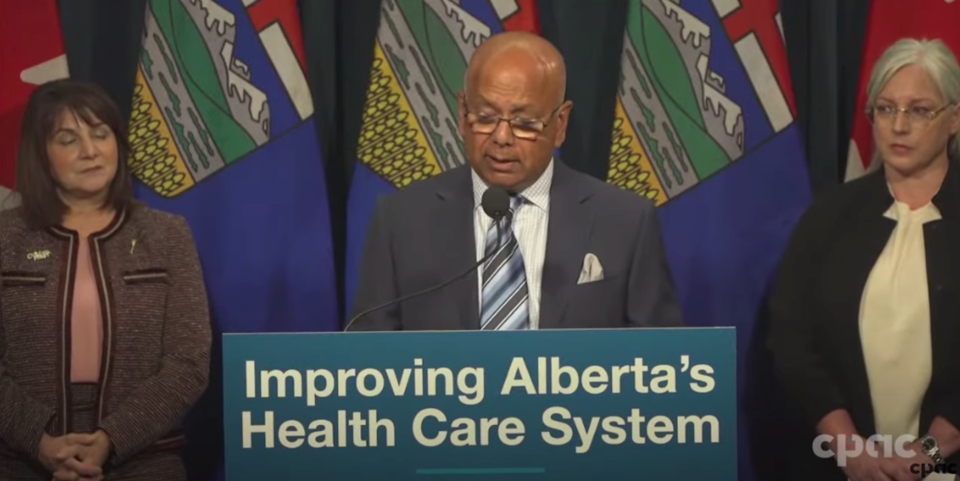WESTLOCK — Westlock family physician Dr. Noel DaCunha, who is also the president of the Alberta College of Family Physicians, says the new Modernizing Alberta’s Primary Health Care System (MAPS) advisory panel report offers a “well-grounded case for change” that is desperately needed to address uncertainties that are preventing medical students, residents and young physicians from pursuing family medicine.
At a Oct. 17 news conference concerning changes to primary health care, Dr. DaCunha said the evidence shows that adding more family physicians will improve health outcomes for Albertans, but uncertainties around practice viability and sustainability are a growing concern for medical students, residents and young physicians.
“In fact, these issues are a significant reason why fewer medical students are choosing to pursue family medicine as a specialty,” said Dr. DaCunha. “We need meaningful responses to this trend with a system re-design.”
Dr. DaCunha said he was also pleased that the college and the Alberta Medical Association (AMA) will be part of a new task force that will investigate ways of reducing the administrative burden for primary care providers and their teams, develop new remuneration models to support comprehensive primary care and provide resources to family physicians with growing patient care loads.
“We are pleased to join the task force and we believe continued collaboration and immediate action will bring us closer to our collective vision, which of course is improved primary health care and outcomes for all our citizens,” he said.
Dr. DaCunha joined Minister of Health Adriana LaGrange at the conference where she announced that the two MAPS reports submitted to the province in the spring would be released to the public, and immediate action would be taken on several recommendations contained in those reports.
These reports had been crafted by advisory panels established through the MAPS initiative in the fall of 2022. Their goals were to identify immediate, medium-term and long-term improvements to Alberta’s primary health care system, which LaGrange admitted was leaving many Albertans without access to primary care.
“We know that currently, many Albertans cannot find a family doctor or have trouble getting in to see the current one that they have. Many feel there is no one to help them with the care that they need, so they end up going to an emergency department at a hospital or not getting any care at all,” LaGrange said.
One of the reports was from a strategic advisory panel that came up with 11 recommendations to re-focus Alberta’s health care system around primary health care, while the second was from an Indigenous advisory panel that developed 22 recommendations aimed at improving health equity for Indigenous people and addressing racism in the health system.
LaGrange said these collective recommendations “will be our guideposts for actions to build a better system.”
While some of these recommendations will require extensive planning and work to achieve, LaGrange said Albertans and their health care providers “need our help as soon as possible,” and as such, some immediate actions were being taken.
These include forming the task force referenced by Dr. DaCunha above that will be mandated to develop an improved compensation model for family medicine, with the goal of better supporting physicians and their teams to have a viable practice.
“I want to highlight the importance of this piece: doctors deserve to be fairly compensated, and we are committed to ensuring family physicians have a compensation model that allows them to provide the highest quality of care for their patients,” LaGrange said.
The task force is also mandated with finding ways for primary care providers to spend more time with their patients by reducing their administrative burden, and coming up with other measures that can be implemented in the short term to stabilize primary care.
“The work will begin immediately, and it will have a very short window. In fact, I’m asking the task force to provide me an interim report by January and final reports by March,” LaGrange said.
The Alberta government is also providing $57 million over three years to help family physicians and nurse practitioners with managing increasing patient loads, which works out to $10,000 each year for an individual physician.
As well, the province will be developing a memorandum of understanding with the AMA to collaborate on a new physician compensation model, along with implementing a new nurse practitioner payment model that will support them in opening clinics, taking on patients and offering services.
In addition, the province is going to expand online mental health services to allow doctors to bill for virtual mental health checks and ensuring physicians are paid if patients can’t provide insurance coverage.
“Taken altogether, these immediate actions will help to address urgent pressures, and strengthen primary health care, as well as improving access to family medicine,” LaGrange said.
She also announced that a new Indigenous health division is being created within the Alberta health ministry, $20 million is being invested into an Indigenous primary care innovation fund, and the position of an Indigenous patient complaint investigator is being created alongside an Elders Roster that will guide Indigenous people through a complaints process.



